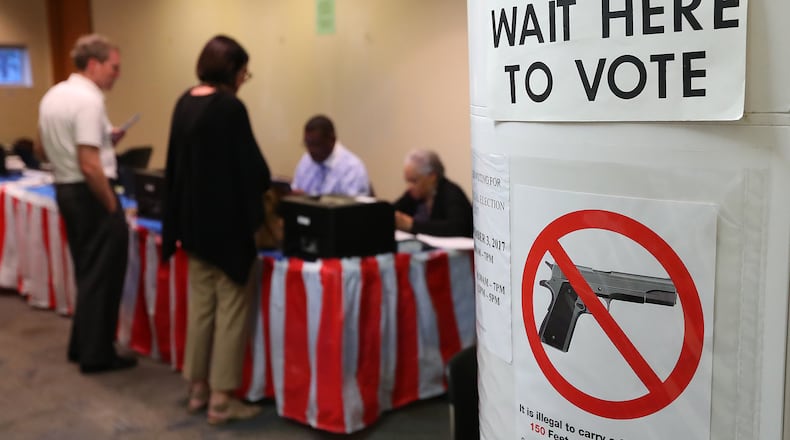Georgia's restrictions on third-party candidates trying to run for the U.S. House of Representatives should be declared unconstitutional, according to a lawsuit filed in federal court Tuesday by the Libertarian Party of Georgia.
No third-party candidate in Georgia has ever collected enough signatures to appear on the ballot for the U.S. House since the state passed an election qualifying law in 1943.
That law requires at least 5 percent of registered voters to sign a petition — that’s about 19,000 signatures needed to field a third-party candidate in any of Georgia’s 14 congressional districts. Meanwhile, candidates nominated by the Republican and Democratic parties automatically appear on the ballot.
“Georgia’s elections for U.S. representative(s) are among the most uncompetitive in the nation,” according to the lawsuit. “In the three election cycles from 2012 through 2016, Georgia has had 15 unopposed races for U.S. representative — more than any other state in the nation.”
Georgia requires more signatures for a third-party congressional candidate to appear on the ballot than any other state in the nation, according to the lawsuit. Thirty states require 10,000 or fewer signatures for a third party to run a full slate of candidates statewide for U.S. House.
The lawsuit lists 27 third-party candidates since 1982 that declared their intention to qualify for election to the U.S. House but were unsuccessful.
The Libertarian Party is asking a judge to declare that Georgia’s ballot access laws violate the First Amendment and 14th Amendment to the U.S. Constitution, which guarantee freedom of speech and due process. It also alleges the state’s laws run afoul of the Constitution’s Equal Protection Clause.
The requirement for third-party candidates to gather signatures from 5 percent of a district’s voters was originally enacted 74 years ago for the purpose of preventing Communist Party candidates from appearing on Georgia ballots, according to the lawsuit.
Fielding third-party candidates for statewide elected offices is easier than for Congress. Statewide candidates must submit a petition signed by 1 percent of registered voters.
In a previous case, a federal judge lowered the signature requirement for presidential candidates to appear on Georgia ballots. U.S. District Judge Richard Story ruled in 2016 that third-party and independent presidential candidates must collect 7,500 signatures rather than about 50,000, or 1 percent of the state's registered voters.
About the Author
Keep Reading
The Latest
Featured




